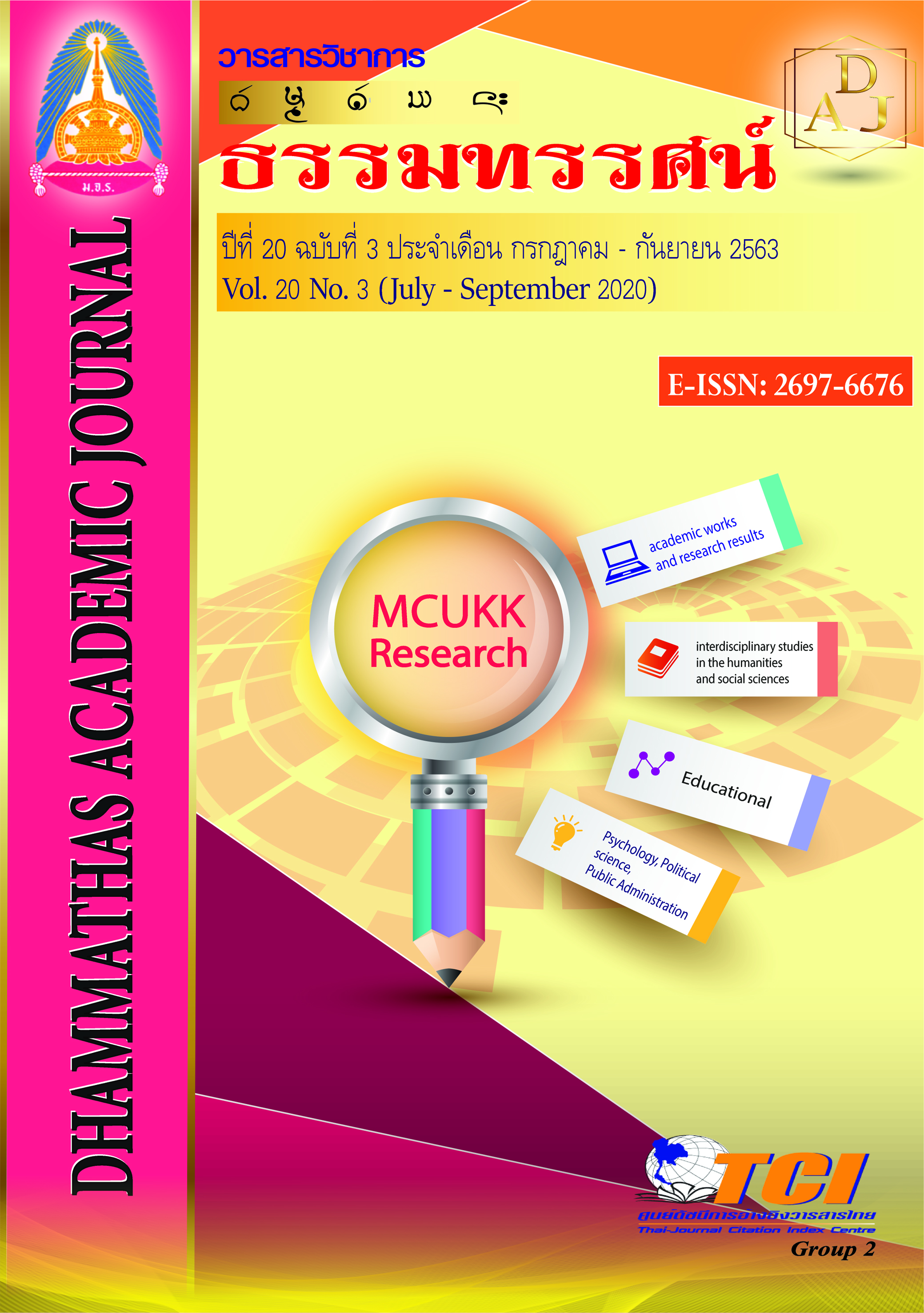Development in Learning Experiences Management for Early Childhood’s Teachers under the Office of Mahasarakham Primary Education Service Area 1
Main Article Content
Abstract
The purposes of the research were: 1) to study current conditions desirable conditions and 2) Development in Learning Experiences Management for Early Childhood’s Teachers under the Office of Mahasarakham Primary Education Service Area 1. There were 2 phases. The phases included 1) study current conditions and desirable conditions in Learning Experiences Management for Early Childhood’s Teachers. There are 137 participants. The second phase was 2) Development in Learning Experiences Management for Early Childhood’s Teachers. The instrumentations are the following ; 1) evaluation forms 2) questionnaire 3) interview forms. The statistics used for analysis data were mean and standard deviation.
The results are as followed :
1. Result of the current conditions in Learning Experiences Management for Early Childhood’s Teachers was at a moderate level in all items. And desirable conditions in Learning Experiences Management for Early Childhood’s Teachers was at a high level. Except the learning experience plan And the class management is at the highest level.
2. Result of a use of a program of development in Learning Experiences Management for Early Childhood’s Teachers. Consists of 6 elements, namely principles, objectives, structures and content How to proceed Activities and development tools And evaluation The teacher development program is divided into pre-development assessments (1.30 hours). Development by training and learning programs can be divided into 5 modules including curriculum analysis, Learning experience plan, Classroom management, Media and technology Evaluation and development assessment (28 hours) Learning by working with other people (8 hours) and integrating Insertion of activities for the development of early childhood learning experiences in their own schools (2 hours), post-development assessment (30 minutes), a total of 40 hours. The feasibility of the program was found to be appropriate at a high level. And have the highest possible level.
Article Details
References
Allen, S. (2007). Assessing the development of young children in child care: A survey of formal assessment practices in one state. Early childhood education journal, 34, 455-465.
Boonpirom, S. (2014). Classroom management. Bangkok : Triple Education.
Chamnisart, B. (2013). Model Development of Academic Administration for Early Childhood Education Management of School Belonging to the Office of Phetchaburi’s Primary School Educational Area. Doctor of Philosophy. Graduate School : Siam University.
Chuensuksomwng, N. (2013). To develop early childhood teachers’ professional competency. Bangkok : Chulalongkorn University.
Department of Academic Affairs. (2002). Research for development of basic school curriculum learning. Bangkok : Kurusapa Printing Ladphrao.
Harvey, M. F. (2002). The Impact of Children’s Audio Books on Preschooler’s Expressive and Receptive Vocabulary Acquisition. Dissertation Abstracts International, 63(4), 1252.
Kongsanok, S. (2013). Early Childhood Education The Heart of Education. www.parliament.go.th/ewtadmin/ewt/...parcy/ewt_ dl_link.php ( Accessed 20 February 2017).
Levin, P. G. (1983). Teachers’ Perceptions, Attitudes, and Reporting of Child Abuse-Neglect. Child Welfare : LXIT(1).
McMurrain, T., Kaufman, M. and Larcia, A. (1979). Orientation to Preschool Assessment: A User’s Guide for the Child Development Assessment Form. Atlanta, Georgia : Humanistics Ltd.
Ministry of Education. (2009) . Educational technology. http://www.moe.go.th/moe/th/news/detail.php?NewsID= 9738&Key=news_research. (Accessed 12 February 2018).
Ministry of Education. (2017). Early Childhood Education Program Guide 2017 (for children aged 3-5 years). Bangkok : Agricultural Cooperatives of Thailand Printing.
Moowisat, J. (2013). Teacher development in the provision of integrated learning experiences for early childhood Ban Map Krat School Nakhon Ratchasima Primary Education Area Office 3. Master of Education. Graduate School : Mahasarakham University.
Parnit, W. (2012). The 21st Century Teaching Styles for Student. Bangkok : Sodsri-Saritpong Foundation.
Prangprapun, J. (2014). Quality of the Thai Education. http://tdri.or.th/tdri-insight/kt22/ (Accessed 22 February 2017).
Srisaad, B. (2003). Basic Research. Bangkok : Suweeyasarn.
Srisaad, B. (2009). Statistical methods for research. The 9th Ed. Bangkok : Suweeyasarn.
Tha Chao, N. (2014). Personnel development in integration of learning experiences for early childhood care centers in Phu Pha Man Khon Kaen province. Master of Education. Graduate School : Mahasarakham University.
The Secretariat of the Senate. (2017). Constitution of The Kingdom of Thailand 2017. Bangkok : The Secretariat of the Senate.
Thongplew, P. (2017) . Program Development Learning Management Competency of Childhood Teachers In the School of Udon Thani Primary Educational Service Area Office 4. Master of Education. Graduate School : Mahasarakham University.

